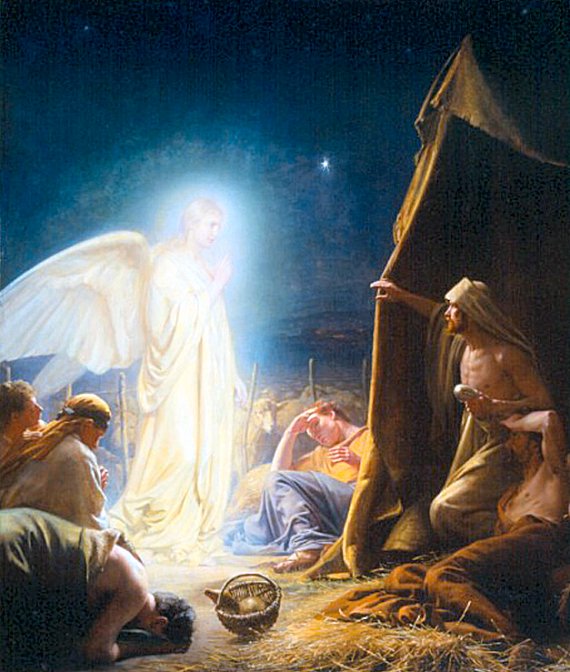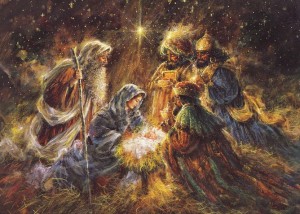As a new father, I have spent a lot of time thinking about how my daughter will experience Christmas. My own family was pretty light on holiday traditions. Honestly, there were a few years the lights never went up on the house and we didn’t get around to doing a tree. One year the lights just stayed on the house for the whole year. We just sort of went with the flow. Sometimes people were just too busy to do things, and that never really bothered me.
But of course, you want your own children to experience some of the “magic of Christmas” and have all of those warm, soul-filling feelings about the season that you remember fondly.
So we fill our homes with the scents of evergreen and cinnamon and peppermint. We make gingerbread and hot chocolate. We prepare meals that make our taste buds dance. We listen to Tchaikovsky and Bing Crosby and the Chipmunks… maybe some Mariah Carrey, in moderation.
But how do you make the story of our Savior’s birth come alive for young minds? It’s not a sensory thing. It’s more than good storytelling. Why do hairs stand up on the back of my neck when I read the angels’ words, “Hosannah to God in the Highest, and on Earth peace, good will toward men.”? It has something to do with conditioning, no doubt. I am sure there are people for whom the Christmas narrative produces none of these feelings.
Even knowing that the scriptural record of Christ’s birth is not only contradictory, but in large part, fabricated to fit the purpose of the writers of Luke and Matthew… Nothing can diminish the magic of the telling.
Is that the Holy Spirit?
Is it that small piece of the supernatural that survives intellectual deconstruction? If so, I want my little girl to feel the Holy Spirit. I want the extra-sensory to have a deeper and more significant impact, than all of the sensory trimmings of Christmas.
I guess that’s what I crave from the church. That intangible little magic. I know it was important to me, and I know for a fact, that I’m incapable of manufacturing it for my daughter. So here’s the rub:
Does losing faith that the church is all the things it claims to be, mean we lose some of the ethereal rewards of faith? If it isn’t as real to me, will it ever be real for her? Will she feel the love of a God who gifted the world his only begotten son? Will she hear in the words of the scriptures, the joyous news of coming redemption? I don’t know. That is a fear I have. I imagine some of you share it.

I do know that this verse rings in my mind with new meaning when I look into my daughter’s eyes:
“Then took he [her] up in his arms, and blessed God, and said, “Lord, now lettest thou thy servant depart in peace, according to thy word: For mine eyes have seen thy salvation.” -Luke 2:28-30
Merry Christmas.







As I struggle just to get my kids to church regularly, I wonder some of the same. I still believe in the spirit and much of religious narrative, but find it hard to know how to pass it on given all the competing tensions of my life. I’m confident they will grow into moral adults, bet wonder how they will learn to know the spirit.
Our neighbor was raised LDS and decided not to take his daughter to church because, in his words, he didn't want to "shove it down her throat." By contrast, we take our kids to church meetings and activities as often as possible so they have a choice. I guess we operate under the 2 Nephi 2:16 philosophy. Six days a week they are subjected to and surrounded by those who subscribe to no religion or are anti-religion as well as those with no moral code whatsoever. Therefore, in our minds, opening the door to religion means they have some balance, two options to choose from.
Having said that, we can't manufacture the Spirit for them or develop the relationship with God we believe they will need. Knowing they will have to choose their own narrative does scare us. So for their sake and ours, we continue to tell them the Christmas stories we were told. Because it is within those stories that God's message is clear: "fear not." That was what Zacharias was told when the miracle of John's birth was announced (Luke 1:13). That was what the angel said to Mary when she learned she would be the mother of the Son of God (Luke 1:30), and the response to Joseph when he contemplated Mary's situation and their relationship (Matthew 1:20). That was the first statement from the angel who led the chorus announcing Christ's birth to the shepherds (Luke 2:10).
How and why we "fear not" is in Luke 1:37, "For with God nothing shall be impossible." That truth is the soul-stirring message of Christmas I hope my children hear and truly understand.